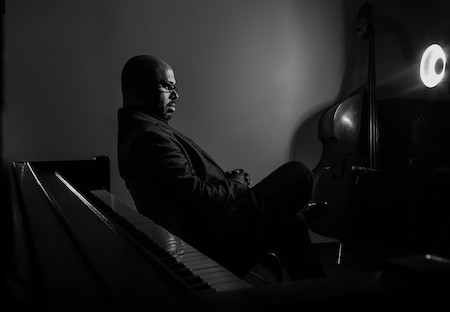Jan 13, 2026 2:09 PM
More Trump-Kennedy Center Cancellations
The fallout from the renaming of the John F. Kennedy Center for the Performing Arts to include President Donald…

“There’s so much history right in Washington, D.C.,” Christian McBride said about bringing his music about the Civil Rights Movement to the nation’s capital.
(Photo: Anna Webber)Bassist Christian McBride is bringing his ambitious civil rights music, which was 20 years in the making, to The Kennedy Center on Friday, Feb. 4, at 8 p.m.
The Movement Revisited: A Musical Portrait Of Four Icons, an album released in 2020, serves as McBride’s masterpiece on “the struggle,” featuring impassioned speeches from Dr. Martin Luther King Jr., Rosa Parks, Malcolm X and Muhammad Ali. The project also includes a short tribute to President Barack Obama.
“It’s such an honor to bring The Movement Revisited to The Kennedy Center, and to be joined by the Howard Gospel Choir of Howard University,” said McBride. “There’s so much history right in Washington, D.C. — from Benjamin Banneker’s role in designing the city, to Martin Luther King Jr. speaking at the Lincoln Monument, and the launch of the Smithsonian’s National Museum of African American History and Culture. Washington, D.C., has always been an important place in the Black American legacy.”
McBride was not yet born when the world witnessed some of the greatest moments in the Civil Rights Movement during the 1960s. As a child in the ’70s, he learned the history in school, but found truth beyond the history books.
“When I was a kid, I used to spend hours looking at old copies of Ebony and Jet magazines that my grandmother saved,” he said. “To read contemporaneous writings by Black writers about events and people who were my history – our history – that was absolutely fascinating to me. It was the greatest gift my grandmother could have given to me.”
Those writings played a major role in the creation of The Movement Revisited: A Musical Portrait Of Four Icons. The work combines elements of jazz, gospel, big band, swing, symphony, theater and dramatic spoken word.
For more information, go to kennedy-center.org. DB

Belá Fleck during an interview with Fredrika Whitfield on CNN.
Jan 13, 2026 2:09 PM
The fallout from the renaming of the John F. Kennedy Center for the Performing Arts to include President Donald…

Peplowski first came to prominence in legacy swing bands, including the final iteration of the Benny Goodman Orchestra, before beginning a solo career in the late 1980s.
Feb 3, 2026 12:10 AM
Ken Peplowski, a clarinetist and tenor saxophonist who straddled the worlds of traditional and modern jazz, died Feb. 2…

The success of Oregon’s first album, 1971’s Music Of Another Present Era, allowed Towner to establish a solo career.
Jan 19, 2026 5:02 PM
Ralph Towner, a guitarist and composer who blended multiple genres, including jazz — and throughout them all remained…

Rico’s Anti-Microbial Instrument Swab
Jan 19, 2026 2:48 PM
With this year’s NAMM Show right around the corner, we can look forward to plenty of new and innovative instruments…

Richie Beirach was particularly renowned for his approach to chromatic harmony, which he used to improvise reharmonizations of originals and standards.
Jan 27, 2026 11:19 AM
Richie Beirach, a pianist and composer who channeled a knowledge of modern classical music into his jazz practice,…